Critical Reflective Essay: Social Work Code of Ethics in Australia
VerifiedAdded on 2022/11/23
|5
|1964
|500
Essay
AI Summary
This critical reflective essay examines social work as a profession in Australia, focusing on the adherence of social workers to the code of ethics. The paper aims to analyze policies designed for social workers, serving as an ethical guide for individual and group practice. It explores the values, responsibilities, and decision-making processes of social workers, highlighting the ethical dilemmas and challenges they face. The essay discusses the core values of social work, such as service, dignity, competence, human relationships, social justice, and integrity, and assesses the impact of the AASW's role in regulating the profession. It reflects on the shift towards a more career-oriented approach, the importance of ethical responsibilities, and the need for social workers to maintain integrity, professionalism, and competence. The essay also explores the impact of political intervention and the importance of rational decision-making in social work practice.
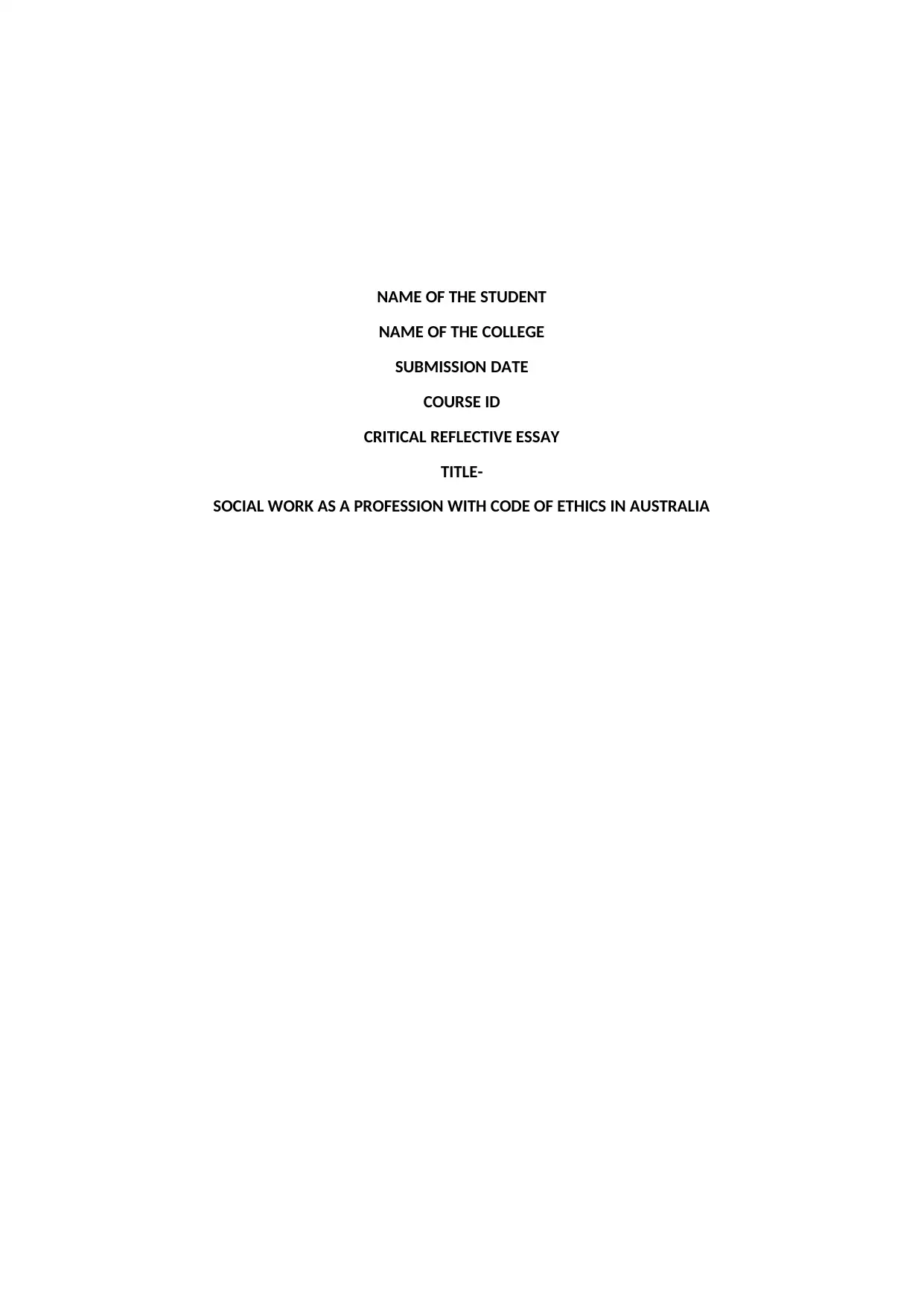
NAME OF THE STUDENT
NAME OF THE COLLEGE
SUBMISSION DATE
COURSE ID
CRITICAL REFLECTIVE ESSAY
TITLE-
SOCIAL WORK AS A PROFESSION WITH CODE OF ETHICS IN AUSTRALIA
NAME OF THE COLLEGE
SUBMISSION DATE
COURSE ID
CRITICAL REFLECTIVE ESSAY
TITLE-
SOCIAL WORK AS A PROFESSION WITH CODE OF ETHICS IN AUSTRALIA
Paraphrase This Document
Need a fresh take? Get an instant paraphrase of this document with our AI Paraphraser
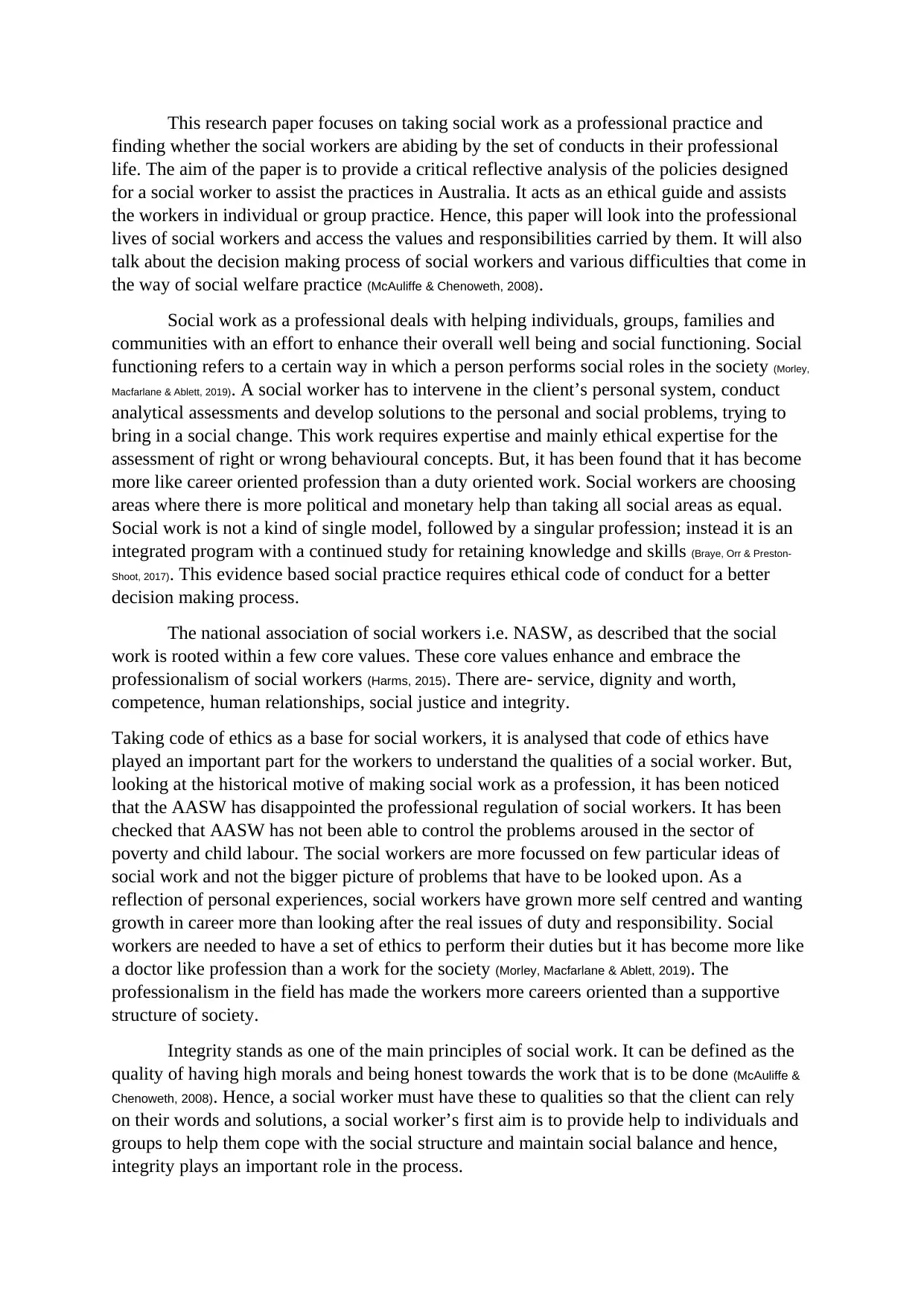
This research paper focuses on taking social work as a professional practice and
finding whether the social workers are abiding by the set of conducts in their professional
life. The aim of the paper is to provide a critical reflective analysis of the policies designed
for a social worker to assist the practices in Australia. It acts as an ethical guide and assists
the workers in individual or group practice. Hence, this paper will look into the professional
lives of social workers and access the values and responsibilities carried by them. It will also
talk about the decision making process of social workers and various difficulties that come in
the way of social welfare practice (McAuliffe & Chenoweth, 2008).
Social work as a professional deals with helping individuals, groups, families and
communities with an effort to enhance their overall well being and social functioning. Social
functioning refers to a certain way in which a person performs social roles in the society (Morley,
Macfarlane & Ablett, 2019). A social worker has to intervene in the client’s personal system, conduct
analytical assessments and develop solutions to the personal and social problems, trying to
bring in a social change. This work requires expertise and mainly ethical expertise for the
assessment of right or wrong behavioural concepts. But, it has been found that it has become
more like career oriented profession than a duty oriented work. Social workers are choosing
areas where there is more political and monetary help than taking all social areas as equal.
Social work is not a kind of single model, followed by a singular profession; instead it is an
integrated program with a continued study for retaining knowledge and skills (Braye, Orr & Preston-
Shoot, 2017). This evidence based social practice requires ethical code of conduct for a better
decision making process.
The national association of social workers i.e. NASW, as described that the social
work is rooted within a few core values. These core values enhance and embrace the
professionalism of social workers (Harms, 2015). There are- service, dignity and worth,
competence, human relationships, social justice and integrity.
Taking code of ethics as a base for social workers, it is analysed that code of ethics have
played an important part for the workers to understand the qualities of a social worker. But,
looking at the historical motive of making social work as a profession, it has been noticed
that the AASW has disappointed the professional regulation of social workers. It has been
checked that AASW has not been able to control the problems aroused in the sector of
poverty and child labour. The social workers are more focussed on few particular ideas of
social work and not the bigger picture of problems that have to be looked upon. As a
reflection of personal experiences, social workers have grown more self centred and wanting
growth in career more than looking after the real issues of duty and responsibility. Social
workers are needed to have a set of ethics to perform their duties but it has become more like
a doctor like profession than a work for the society (Morley, Macfarlane & Ablett, 2019). The
professionalism in the field has made the workers more careers oriented than a supportive
structure of society.
Integrity stands as one of the main principles of social work. It can be defined as the
quality of having high morals and being honest towards the work that is to be done (McAuliffe &
Chenoweth, 2008). Hence, a social worker must have these to qualities so that the client can rely
on their words and solutions, a social worker’s first aim is to provide help to individuals and
groups to help them cope with the social structure and maintain social balance and hence,
integrity plays an important role in the process.
finding whether the social workers are abiding by the set of conducts in their professional
life. The aim of the paper is to provide a critical reflective analysis of the policies designed
for a social worker to assist the practices in Australia. It acts as an ethical guide and assists
the workers in individual or group practice. Hence, this paper will look into the professional
lives of social workers and access the values and responsibilities carried by them. It will also
talk about the decision making process of social workers and various difficulties that come in
the way of social welfare practice (McAuliffe & Chenoweth, 2008).
Social work as a professional deals with helping individuals, groups, families and
communities with an effort to enhance their overall well being and social functioning. Social
functioning refers to a certain way in which a person performs social roles in the society (Morley,
Macfarlane & Ablett, 2019). A social worker has to intervene in the client’s personal system, conduct
analytical assessments and develop solutions to the personal and social problems, trying to
bring in a social change. This work requires expertise and mainly ethical expertise for the
assessment of right or wrong behavioural concepts. But, it has been found that it has become
more like career oriented profession than a duty oriented work. Social workers are choosing
areas where there is more political and monetary help than taking all social areas as equal.
Social work is not a kind of single model, followed by a singular profession; instead it is an
integrated program with a continued study for retaining knowledge and skills (Braye, Orr & Preston-
Shoot, 2017). This evidence based social practice requires ethical code of conduct for a better
decision making process.
The national association of social workers i.e. NASW, as described that the social
work is rooted within a few core values. These core values enhance and embrace the
professionalism of social workers (Harms, 2015). There are- service, dignity and worth,
competence, human relationships, social justice and integrity.
Taking code of ethics as a base for social workers, it is analysed that code of ethics have
played an important part for the workers to understand the qualities of a social worker. But,
looking at the historical motive of making social work as a profession, it has been noticed
that the AASW has disappointed the professional regulation of social workers. It has been
checked that AASW has not been able to control the problems aroused in the sector of
poverty and child labour. The social workers are more focussed on few particular ideas of
social work and not the bigger picture of problems that have to be looked upon. As a
reflection of personal experiences, social workers have grown more self centred and wanting
growth in career more than looking after the real issues of duty and responsibility. Social
workers are needed to have a set of ethics to perform their duties but it has become more like
a doctor like profession than a work for the society (Morley, Macfarlane & Ablett, 2019). The
professionalism in the field has made the workers more careers oriented than a supportive
structure of society.
Integrity stands as one of the main principles of social work. It can be defined as the
quality of having high morals and being honest towards the work that is to be done (McAuliffe &
Chenoweth, 2008). Hence, a social worker must have these to qualities so that the client can rely
on their words and solutions, a social worker’s first aim is to provide help to individuals and
groups to help them cope with the social structure and maintain social balance and hence,
integrity plays an important role in the process.
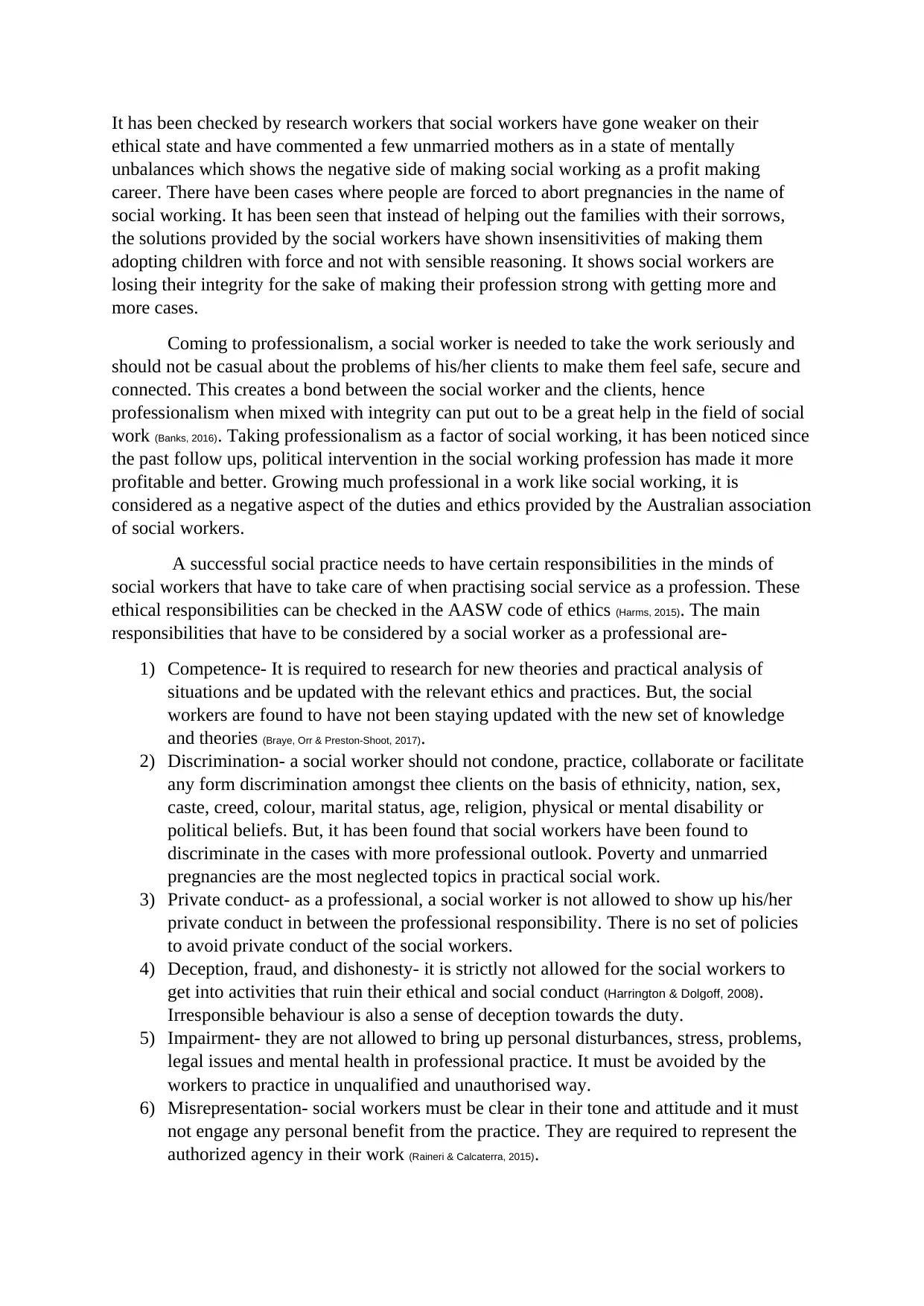
It has been checked by research workers that social workers have gone weaker on their
ethical state and have commented a few unmarried mothers as in a state of mentally
unbalances which shows the negative side of making social working as a profit making
career. There have been cases where people are forced to abort pregnancies in the name of
social working. It has been seen that instead of helping out the families with their sorrows,
the solutions provided by the social workers have shown insensitivities of making them
adopting children with force and not with sensible reasoning. It shows social workers are
losing their integrity for the sake of making their profession strong with getting more and
more cases.
Coming to professionalism, a social worker is needed to take the work seriously and
should not be casual about the problems of his/her clients to make them feel safe, secure and
connected. This creates a bond between the social worker and the clients, hence
professionalism when mixed with integrity can put out to be a great help in the field of social
work (Banks, 2016). Taking professionalism as a factor of social working, it has been noticed since
the past follow ups, political intervention in the social working profession has made it more
profitable and better. Growing much professional in a work like social working, it is
considered as a negative aspect of the duties and ethics provided by the Australian association
of social workers.
A successful social practice needs to have certain responsibilities in the minds of
social workers that have to take care of when practising social service as a profession. These
ethical responsibilities can be checked in the AASW code of ethics (Harms, 2015). The main
responsibilities that have to be considered by a social worker as a professional are-
1) Competence- It is required to research for new theories and practical analysis of
situations and be updated with the relevant ethics and practices. But, the social
workers are found to have not been staying updated with the new set of knowledge
and theories (Braye, Orr & Preston-Shoot, 2017).
2) Discrimination- a social worker should not condone, practice, collaborate or facilitate
any form discrimination amongst thee clients on the basis of ethnicity, nation, sex,
caste, creed, colour, marital status, age, religion, physical or mental disability or
political beliefs. But, it has been found that social workers have been found to
discriminate in the cases with more professional outlook. Poverty and unmarried
pregnancies are the most neglected topics in practical social work.
3) Private conduct- as a professional, a social worker is not allowed to show up his/her
private conduct in between the professional responsibility. There is no set of policies
to avoid private conduct of the social workers.
4) Deception, fraud, and dishonesty- it is strictly not allowed for the social workers to
get into activities that ruin their ethical and social conduct (Harrington & Dolgoff, 2008).
Irresponsible behaviour is also a sense of deception towards the duty.
5) Impairment- they are not allowed to bring up personal disturbances, stress, problems,
legal issues and mental health in professional practice. It must be avoided by the
workers to practice in unqualified and unauthorised way.
6) Misrepresentation- social workers must be clear in their tone and attitude and it must
not engage any personal benefit from the practice. They are required to represent the
authorized agency in their work (Raineri & Calcaterra, 2015).
ethical state and have commented a few unmarried mothers as in a state of mentally
unbalances which shows the negative side of making social working as a profit making
career. There have been cases where people are forced to abort pregnancies in the name of
social working. It has been seen that instead of helping out the families with their sorrows,
the solutions provided by the social workers have shown insensitivities of making them
adopting children with force and not with sensible reasoning. It shows social workers are
losing their integrity for the sake of making their profession strong with getting more and
more cases.
Coming to professionalism, a social worker is needed to take the work seriously and
should not be casual about the problems of his/her clients to make them feel safe, secure and
connected. This creates a bond between the social worker and the clients, hence
professionalism when mixed with integrity can put out to be a great help in the field of social
work (Banks, 2016). Taking professionalism as a factor of social working, it has been noticed since
the past follow ups, political intervention in the social working profession has made it more
profitable and better. Growing much professional in a work like social working, it is
considered as a negative aspect of the duties and ethics provided by the Australian association
of social workers.
A successful social practice needs to have certain responsibilities in the minds of
social workers that have to take care of when practising social service as a profession. These
ethical responsibilities can be checked in the AASW code of ethics (Harms, 2015). The main
responsibilities that have to be considered by a social worker as a professional are-
1) Competence- It is required to research for new theories and practical analysis of
situations and be updated with the relevant ethics and practices. But, the social
workers are found to have not been staying updated with the new set of knowledge
and theories (Braye, Orr & Preston-Shoot, 2017).
2) Discrimination- a social worker should not condone, practice, collaborate or facilitate
any form discrimination amongst thee clients on the basis of ethnicity, nation, sex,
caste, creed, colour, marital status, age, religion, physical or mental disability or
political beliefs. But, it has been found that social workers have been found to
discriminate in the cases with more professional outlook. Poverty and unmarried
pregnancies are the most neglected topics in practical social work.
3) Private conduct- as a professional, a social worker is not allowed to show up his/her
private conduct in between the professional responsibility. There is no set of policies
to avoid private conduct of the social workers.
4) Deception, fraud, and dishonesty- it is strictly not allowed for the social workers to
get into activities that ruin their ethical and social conduct (Harrington & Dolgoff, 2008).
Irresponsible behaviour is also a sense of deception towards the duty.
5) Impairment- they are not allowed to bring up personal disturbances, stress, problems,
legal issues and mental health in professional practice. It must be avoided by the
workers to practice in unqualified and unauthorised way.
6) Misrepresentation- social workers must be clear in their tone and attitude and it must
not engage any personal benefit from the practice. They are required to represent the
authorized agency in their work (Raineri & Calcaterra, 2015).
⊘ This is a preview!⊘
Do you want full access?
Subscribe today to unlock all pages.

Trusted by 1+ million students worldwide
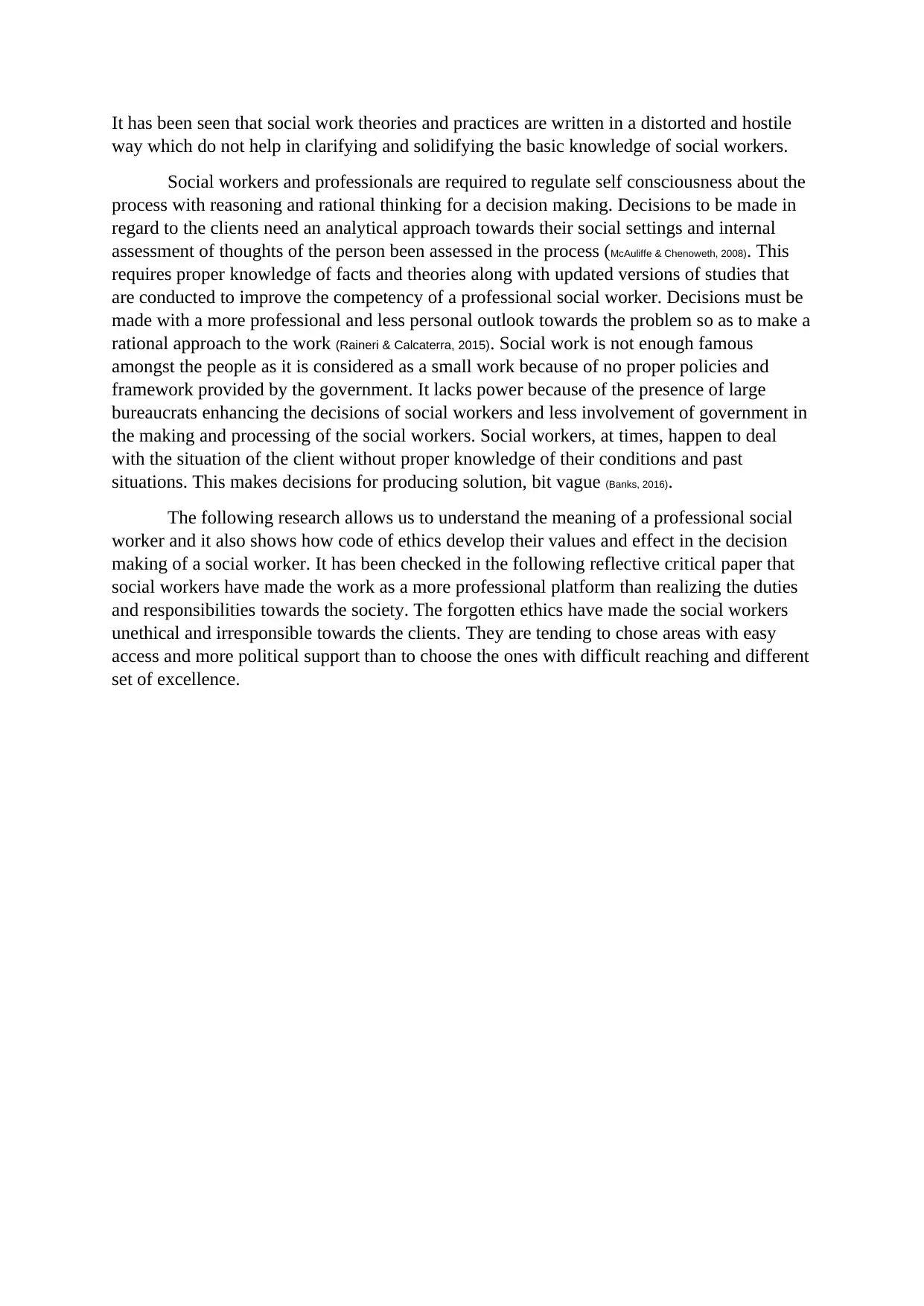
It has been seen that social work theories and practices are written in a distorted and hostile
way which do not help in clarifying and solidifying the basic knowledge of social workers.
Social workers and professionals are required to regulate self consciousness about the
process with reasoning and rational thinking for a decision making. Decisions to be made in
regard to the clients need an analytical approach towards their social settings and internal
assessment of thoughts of the person been assessed in the process (McAuliffe & Chenoweth, 2008). This
requires proper knowledge of facts and theories along with updated versions of studies that
are conducted to improve the competency of a professional social worker. Decisions must be
made with a more professional and less personal outlook towards the problem so as to make a
rational approach to the work (Raineri & Calcaterra, 2015). Social work is not enough famous
amongst the people as it is considered as a small work because of no proper policies and
framework provided by the government. It lacks power because of the presence of large
bureaucrats enhancing the decisions of social workers and less involvement of government in
the making and processing of the social workers. Social workers, at times, happen to deal
with the situation of the client without proper knowledge of their conditions and past
situations. This makes decisions for producing solution, bit vague (Banks, 2016).
The following research allows us to understand the meaning of a professional social
worker and it also shows how code of ethics develop their values and effect in the decision
making of a social worker. It has been checked in the following reflective critical paper that
social workers have made the work as a more professional platform than realizing the duties
and responsibilities towards the society. The forgotten ethics have made the social workers
unethical and irresponsible towards the clients. They are tending to chose areas with easy
access and more political support than to choose the ones with difficult reaching and different
set of excellence.
way which do not help in clarifying and solidifying the basic knowledge of social workers.
Social workers and professionals are required to regulate self consciousness about the
process with reasoning and rational thinking for a decision making. Decisions to be made in
regard to the clients need an analytical approach towards their social settings and internal
assessment of thoughts of the person been assessed in the process (McAuliffe & Chenoweth, 2008). This
requires proper knowledge of facts and theories along with updated versions of studies that
are conducted to improve the competency of a professional social worker. Decisions must be
made with a more professional and less personal outlook towards the problem so as to make a
rational approach to the work (Raineri & Calcaterra, 2015). Social work is not enough famous
amongst the people as it is considered as a small work because of no proper policies and
framework provided by the government. It lacks power because of the presence of large
bureaucrats enhancing the decisions of social workers and less involvement of government in
the making and processing of the social workers. Social workers, at times, happen to deal
with the situation of the client without proper knowledge of their conditions and past
situations. This makes decisions for producing solution, bit vague (Banks, 2016).
The following research allows us to understand the meaning of a professional social
worker and it also shows how code of ethics develop their values and effect in the decision
making of a social worker. It has been checked in the following reflective critical paper that
social workers have made the work as a more professional platform than realizing the duties
and responsibilities towards the society. The forgotten ethics have made the social workers
unethical and irresponsible towards the clients. They are tending to chose areas with easy
access and more political support than to choose the ones with difficult reaching and different
set of excellence.
Paraphrase This Document
Need a fresh take? Get an instant paraphrase of this document with our AI Paraphraser
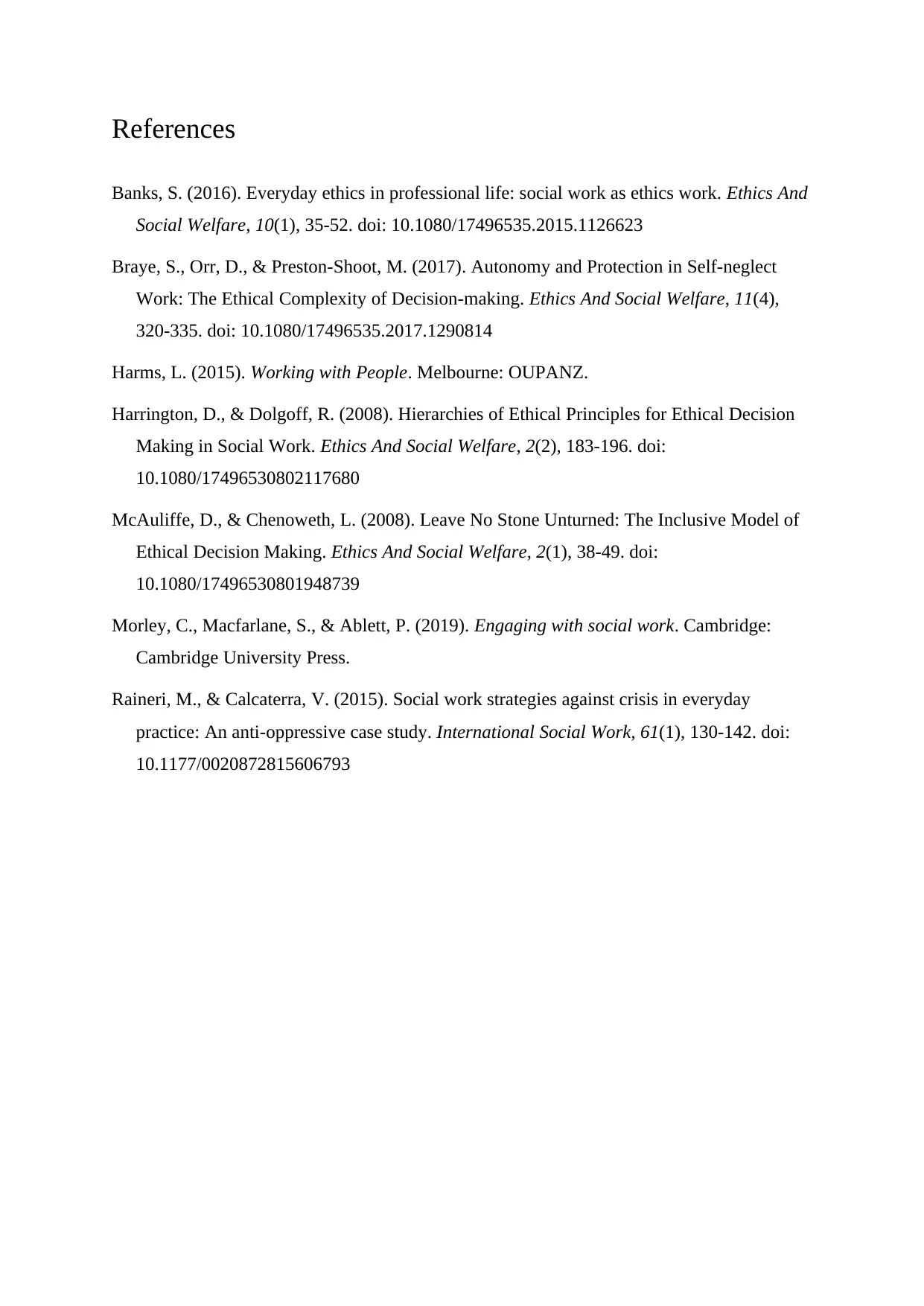
References
Banks, S. (2016). Everyday ethics in professional life: social work as ethics work. Ethics And
Social Welfare, 10(1), 35-52. doi: 10.1080/17496535.2015.1126623
Braye, S., Orr, D., & Preston-Shoot, M. (2017). Autonomy and Protection in Self-neglect
Work: The Ethical Complexity of Decision-making. Ethics And Social Welfare, 11(4),
320-335. doi: 10.1080/17496535.2017.1290814
Harms, L. (2015). Working with People. Melbourne: OUPANZ.
Harrington, D., & Dolgoff, R. (2008). Hierarchies of Ethical Principles for Ethical Decision
Making in Social Work. Ethics And Social Welfare, 2(2), 183-196. doi:
10.1080/17496530802117680
McAuliffe, D., & Chenoweth, L. (2008). Leave No Stone Unturned: The Inclusive Model of
Ethical Decision Making. Ethics And Social Welfare, 2(1), 38-49. doi:
10.1080/17496530801948739
Morley, C., Macfarlane, S., & Ablett, P. (2019). Engaging with social work. Cambridge:
Cambridge University Press.
Raineri, M., & Calcaterra, V. (2015). Social work strategies against crisis in everyday
practice: An anti-oppressive case study. International Social Work, 61(1), 130-142. doi:
10.1177/0020872815606793
Banks, S. (2016). Everyday ethics in professional life: social work as ethics work. Ethics And
Social Welfare, 10(1), 35-52. doi: 10.1080/17496535.2015.1126623
Braye, S., Orr, D., & Preston-Shoot, M. (2017). Autonomy and Protection in Self-neglect
Work: The Ethical Complexity of Decision-making. Ethics And Social Welfare, 11(4),
320-335. doi: 10.1080/17496535.2017.1290814
Harms, L. (2015). Working with People. Melbourne: OUPANZ.
Harrington, D., & Dolgoff, R. (2008). Hierarchies of Ethical Principles for Ethical Decision
Making in Social Work. Ethics And Social Welfare, 2(2), 183-196. doi:
10.1080/17496530802117680
McAuliffe, D., & Chenoweth, L. (2008). Leave No Stone Unturned: The Inclusive Model of
Ethical Decision Making. Ethics And Social Welfare, 2(1), 38-49. doi:
10.1080/17496530801948739
Morley, C., Macfarlane, S., & Ablett, P. (2019). Engaging with social work. Cambridge:
Cambridge University Press.
Raineri, M., & Calcaterra, V. (2015). Social work strategies against crisis in everyday
practice: An anti-oppressive case study. International Social Work, 61(1), 130-142. doi:
10.1177/0020872815606793
1 out of 5
Related Documents
Your All-in-One AI-Powered Toolkit for Academic Success.
+13062052269
info@desklib.com
Available 24*7 on WhatsApp / Email
![[object Object]](/_next/static/media/star-bottom.7253800d.svg)
Unlock your academic potential
Copyright © 2020–2026 A2Z Services. All Rights Reserved. Developed and managed by ZUCOL.





